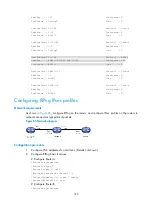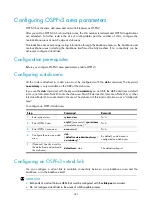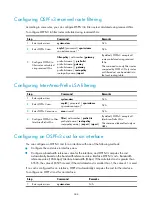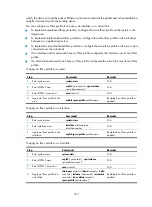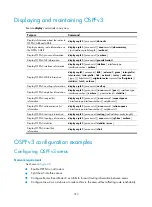
346
Configuring OSPFv3 route redistribution
Because OSPFv3 is a link state routing protocol, it cannot directly filter LSAs to be advertised. OSPFv3
filters only redistributed routes. Only routes that are not filtered out can be advertised in LSAs.
Executing the
import-route
or
default-route-advertise
command on a router makes it become an ASBR.
To configure OSPFv3 route redistribution:
Step Command
Remarks
1.
Enter system view.
system-view
N/A
2.
Enter OSPFv3 view.
ospfv3
[
process-id
|
vpn-instance
vpn-instance-name
] *
N/A
3.
(Optional.) Specify a default
cost for redistributed routes.
default cost
value
The default setting is 1.
4.
Configure OSPFv3 to
redistribute routes from other
routing protocols.
import-route
protocol
[
process-id
|
all-processes
|
allow-ibgp
] [
cost
cost
|
route-policy
route-policy-name
|
type
type
] *
By default, route redistribution
is disabled.
5.
(Optional.) Configure
OSPFv3 to redistribute a
default route.
default-route-advertise
[ [
always
|
permit-calculate-other
] |
cost
cost
|
route-policy
route-policy-name
|
type
type
] *
By default, no default route is
redistributed.
This command can only inject
and advertise a default route.
6.
(Optional.) Configure
OSPFv3 to filter redistributed
routes.
filter-policy
{
acl6-number
|
prefix-list
prefix-list-name
}
export
[
protocol
[
process-id
] ]
By default, OSPFv3 accepts
all redistributed routes.
This command filters only
routes redistributed with the
import-route
command. If the
import-route
command is not
configured, executing this
command does not take
effect.
Tuning and optimizing OSPFv3 networks
This section describes configurations of OSPFv3 timers, interface DR priority, and the logging of
neighbor state changes.
Configuration prerequisites
Before you tune and optimize OSPFv3 networks, complete the following tasks:
•
Configure IPv6 addresses for interfaces to ensure IPv6 connectivity between neighboring nodes.
•
Enable OSPFv3.




